Climate Catastrophe?
Or Climate Change as has been ongoing for millenia?
Or something in between? Climate change is real, as is the greenhouse effect. Yet anthropogenic carbon dioxide isn’t the only primary driver of the real global warming we're experiencing. The historical record shows there are many natural factors that have stronger impact than an increase in the atmospheric CO2 level from 0.03 to 0.04% (and similar increases in methane and nitrous oxide). Why is it that discussions of important issues so often devolve to a binary categorization of either being a "climate denier" or instead a believer that “the science is settled” and we're heading for "climate catastrophe" unless we embrace the green new deal? With reality somewhere in between, key questions should be- what fraction of the warming we're seeing is due to greenhouse gases vs natural causes, and how much control can we exert?
Is it fair to use examples of severe WEATHER as proof of CLIMATE change when we've had severe weather and forest fires and floods and famine long before we started emitting unnatural amounts of CO2, CH4, and N2O? The way weather is reported reflects a bias steering us to believe we face climate catastrophe, never mind for example that this graph of annual tropical storm intensity ("Accumulated Cyclone Energy") shows that the increase, while positive, hardly matches what we see and hear from “scientists” favored by most media outlets (and politicians who perhaps have ulterior motives). If we could magically stop emitting CO2 today, we’d still have severe weather and forest fires and floods. Up to date ACE data for the entire globe is available from Colorado State University.
A rudimentary cost/benefit analysis, even assuming CO2 IS the primary driver of warming, can be done by taking the most optimistic scenario of IPCC-mandated greenhouse gas emission reductions compared to a second scenario of emissions if we make no changes, plugging the resulting CO2 levels into the models used in recent IPCC reports, and comparing the outputs (average global temperature in 20 years, 50 years, 100 years, etc.). Is the difference (and resulting impact) large enough to justify handcuffing our productivity and livelihood with higher energy costs that result in higher inflation, job losses to countries not bound by the same limitations, and a lower standard of living? At a time when we're still adding to our mountain of national debt, the real catastrophe we face is how our children and grandchildren are going to cope with so much debt ($250,000 per household). Perhaps our money would be more wisely spent on adapting to a warmer planet with rising sea level.
We already have a rich history of climate models dating back to the time of Al Gore's movie and early IPCC reports that exaggerated warming. This history suggests CO2 isn't as strong a driver as previously thought, and that there's more "buffering" in nature than has been appreciated (including heat capacity in our oceans). Nature is complex and I think it's anthropocentric to believe we can manage global temperature based on a single factor (greenhouse gas concentrations). Temperature changes of both longer and shorter cycles throughout the millennia also demonstrate the significance of natural factors (many of those still unknown; real scientists have a healthy respect for the unknown unless they’re arrogant).
The most complete treatise I've read on what's known and unknown about climate change is the well-referenced book by Steven C. Koonin "Unsettled: What Climate Science Tells Us, What It Doesn't, and Why It Matters" and it’s a good investment of time.
To be sure, it's important to evolve to renewable energy and sustainable feedstocks for reasons besides just climate change. Yet it should be done at a rational rate. To satisfy our needs for energy (even accounting for significant conservation), clean and safe nuclear energy is needed now (fission until fusion is ready), and will be needed even after eventual transition away from fossil fuels. Embrace clean/safe nuclear in order to reduce CO2 emissions.
Regarding increases in average global temperature, most places on earth see far more dramatic changes every 24 hours and every season than three degrees, illustrated by this 365-day plot for one random spot showing one year along with record extremes over the last 100 years. Besides rising sea level (which hasn’t been as dramatic as forecast by Al Gore or early IPCC reports) and melting glaciers (which has been ongoing since the last ice age), we can adapt to climate change if we work together on things we have a greater level of control over than average global temperature.
All those hustlers and their schemes trying to convince us we face Climate Catastrophe in 12 or 20 years are distracting us from the far more real catastrophe we face if we can't get a handle on our huge national debt still increasing at an alarming rate, made even more dangerous by the higher interest rates we now have to pay. Even if global warming accelerates to the extent the faithful believers claim, the number of people affected (primarily those along coastlines due to rising sea level) are smaller than those who will be affected by our out-of-control fiscal irresponsibility. Furthermore, sea level rise is expected independent of the success of CO2 emission reduction so it behooves us to be prepared. Is anyone paying attention to the real issues that will affect us most?
For more information, this book by Steven Koonin is worth a read-
While the greenhouse effect is real and does reduce the energy that radiates away from the earth into outer space, by far the dominant term in the earth’s energy balance is what comes from the sun. This is illustrated simplistically by how much the temperature increases each day during summer compared to temperature variation when the sun is lower in the sky and/or hidden by clouds or smoke or volcanic ash. Just as nature is complicated regarding the many factors that affect daily weather, so is she regarding the many factors that affect climate (e.g., as measured by the long-term temperature changes illustrated in Al Gore’s movie).
Another visual example of the power of solar radiation is the rate at which snow melts in mid-March compared to December 21st in the middle latitudes. Even small changes in the so-called Solar Constant (beyond regular changes due to the sunspot cycle) impact the energy balance of this globe we live on. The earth’s albedo (reflectivity due to clouds and aerosols including smoke and smog) and ocean currents are two other factors that impact the energy balance in different ways. Science also teaches that there are often factors not yet understood in play.
The Global Climate Intelligence Group's declaration that the climate change we're seeing is not an "emergency" has so far been signed by over 1600 scientists, and while their statement downplays the role of CO2, their point that natural causes are important too is well taken. As time goes on more professionals are willing to break from the orthodoxy of "climate catastrophe" and call for smarter cost/benefit analyses on our efforts to wean ourselves of fossil fuels. It's not the number of experts who line up on one side or the other, rather it's the logical quality of arguments that counts.
How completely do we understand the impact of volcanic eruptions on climate? Remember when 146 billion kilograms of water vapor was blasted into the earth's stratosphere by the Tonga volcano in January 2022, increasing the greenhouse effect since water vapor is a much stronger greenhouse gas than CO2 (NASA link)? The earth continues to warm, yet not catastrophically, and human impact on climate is not greater than nature's even though both are important. How long will the greenhouse effect be enhanced by that water vapor, and what have water levels been in the stratosphere in previous centuries? There are many good reasons to evolve petroleum-based to renewable resources (the author spent the first 10 years of his career at the Laboratory of Renewable Resource Engineering and supports continued work) yet an overhyped promise that it’ll avert a "climate catastrophe" only diminishes the credibility of scientists who should be seen as objective and trustworthy.
How completely have we investigated the possibility that changes in viscous magma convection (which occur over long periods of time) might sometimes occur over shorter periods too, and contribute to ocean warming? What's the impact of our magnetic north pole drifting faster than it used to? Have we looked closer at other changes in radiation coming from the sun including even magnetic activity? Here’s an interesting set of natural factors that impact the earth’s energy balance.
Another example of what's still unknown about climate change is research into the cause of so-called Dansgaard–Oeschger events. How many other factors will we become aware of as scientists continue to learn about what’s caused climate change in the past?
The "climate catastrophe" believers harp on natural factors affecting climate only being slow-changing over many centuries while ignoring factors that cause shorter-term (e.g., 50-100 yrs) variations. Looking at the temperature record from ice core samples there are shorter-term variations superimposed on the longer-term variations even though shorter-term variations are often masked since while diffusion of CO2 and water isotopes in ice is very low, it's not zero so decades are often blurry.
Geology leaves evidence often missed by atmospheric scientists, for example the coulees and channeled scablands of eastern Washington where repeated ice dams resulted in periodic massive floods. Michigan native Harley Bretz was trained as a biologist and it took many decades for geologists comfortable with uniformitarianism to finally accept his theory of what caused the recuring cataclysmic ice dam floods in the Spokane basin. The average period of ice build-up and flood has been estimated to be 55 years, so besides melting point suppression at elevated pressure (which makes ice skates glide) as the height of the ice and water increased, this is evidence of historic temperature cycles of ~50-100 year duration due to natural causes independent of CO2. The ice core proxy data shows both longer- and shorter-term temperature changes due to a variety of natural causes long before humans began burning fossil fuels, and geological evidence confirms.
“Crisis” while massive Chinese CO2 emissions keep increasing
If we're really heading for climate catastrophe in 12-20 years as the “experts” mentioned above claim, why do we accept continued high and increasing CO2 emissions from China while we've been handcuffing the US economy by reducing American emissions faster than a more reasoned evolution away from fossil fuels would dictate? China emits over twice as much as the US.
The expressed importance of fairness in developing the CO2 emission limits agreed to in the Kyoto and Paris Climate Accords implies we're NOT heading for catastrophe. If we were, we’d be calling for more serious limitations from the largest emitter. That it's difficult for Google to find for this author TOTAL CO2 emissions when most of the data is only reported as PER-CAPITA suggests this is as much or more about economic equity as it is averting climate catastrophe. Since the Kyoto Protocol took effect in 2005, the US and EU have reduced CO2 emissions, while those of China and India continue to increase. To the extent the Greenhouse Effect is going to lead us to catastrophe, this increase should not be allowed! Yet we’re not heading for catastrophe, so China and India and third world countries should be allowed to grow at a moderate rate while encouraged to reduce emissions. And the US and EU should reinstate the All-Of-The-Above energy policy we had from 2016-2020 while we also work to reduce the cost of renewable energy (including safe/clean nuclear). At the same time, we should prepare for the impacts of continued global warming, including rising sea level and also for severe weather as has occurred for centuries.
Finally, two adverse impacts of “shutting down” fossil fuels (as President Biden promised to do during his 2020 campaign) by restricting supply and driving up energy prices are 1) higher inflation which is like a tax increase on everyone, especially lower income folks, and 2) significant foreign relations challenges making the Ukraine and Middle East problems more dangerous. Seven Presidents including Jimmy Carter have recognised the importance of Energy Independence toward relieving friction between foreign adversaries. A more realistic cost/benefit analysis of the future impact of Climate Change, as well as mitigation efforts, points us in the direction of the "All-Of-The-Above" energy policy previous presidents have followed. Will we wise up?
In conclusion, humans have adapted to climate change for over 200 centuries and we can now too. We live with temperature changes far greater than 3-4 degrees C from season to season and from place to place. We cope with severe weather & floods & forest fires, and sadly those will continue. We'd better adapt to rising sea level since that's going to happen no matter how quickly we stop emitting CO2. Even if the holy grail of developing technology to suck CO2 out of the atmosphere becomes practical at large scale that will only partially mitigate the sea level impact (does anyone think glaciers are going to re-create before Milankovitch cycles send us into the next ice age far into the future). It's child abuse to make hyperbolic claims like "catastrophe" and "emergency" and "the world will be unrecognizable" when rising anxiety is already a serious mental health problem, even for older kids and adults. We can simultaneously work to reduce CO2 emissions (as the US and EU have been doing) AND harden our systems to withstand the impact of the severe weather that's always occurred and always will, although we need to shift some resources away from Green New Deal projects that go beyond the point of diminishing returns. And we'll be wise to stop spending more money than we have since a future cataclysmic financial collapse poses a greater threat to more people than climate change.
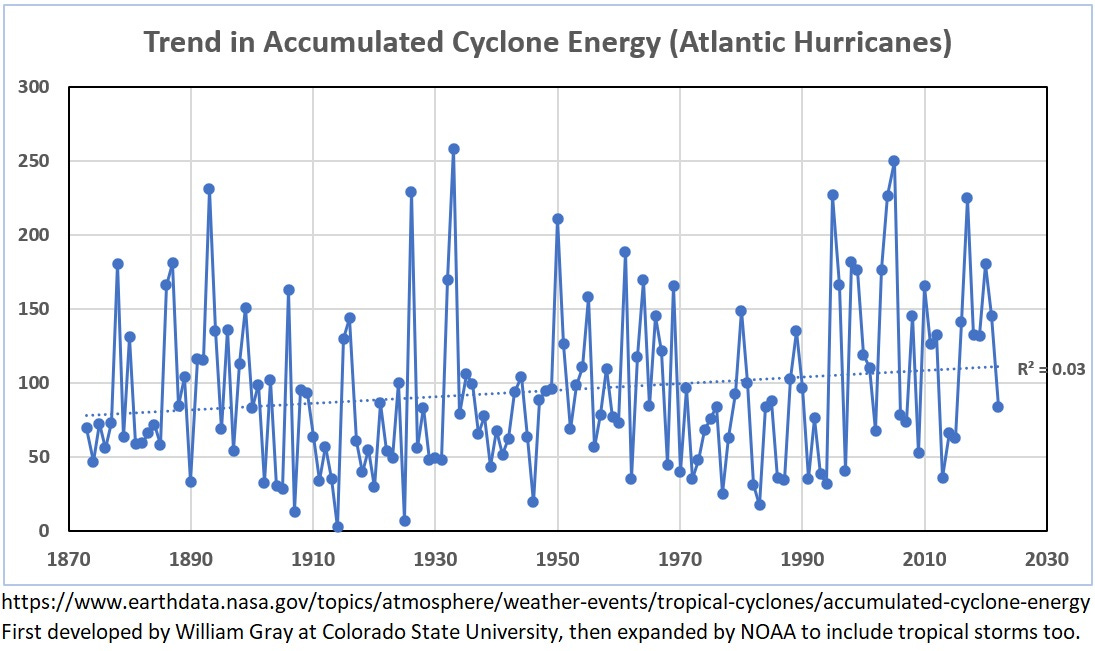
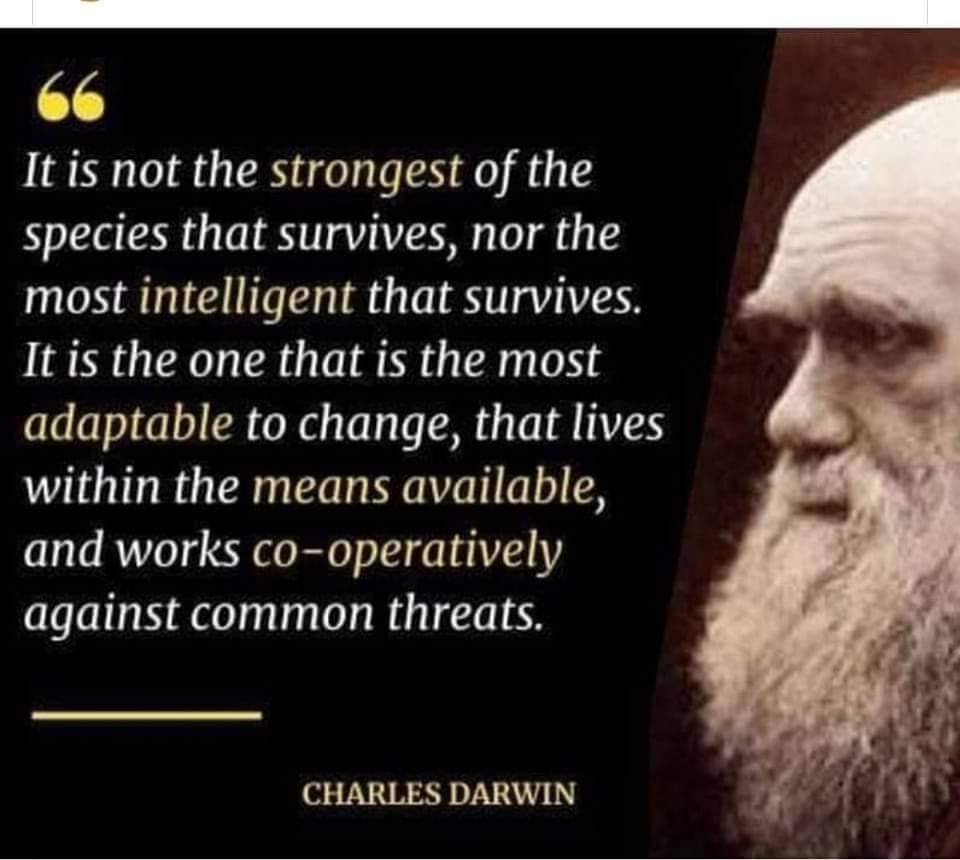
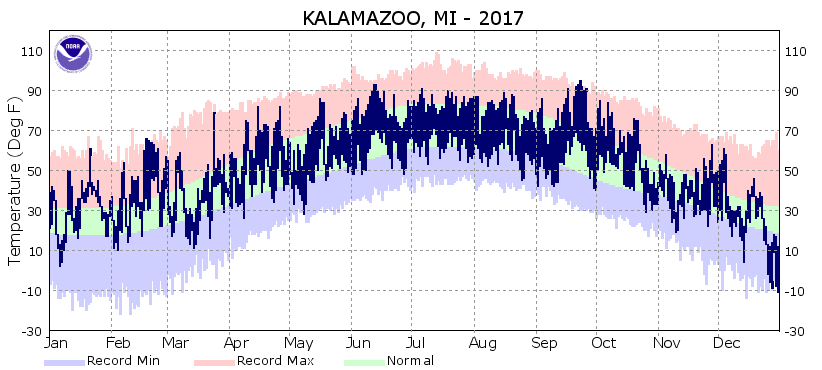
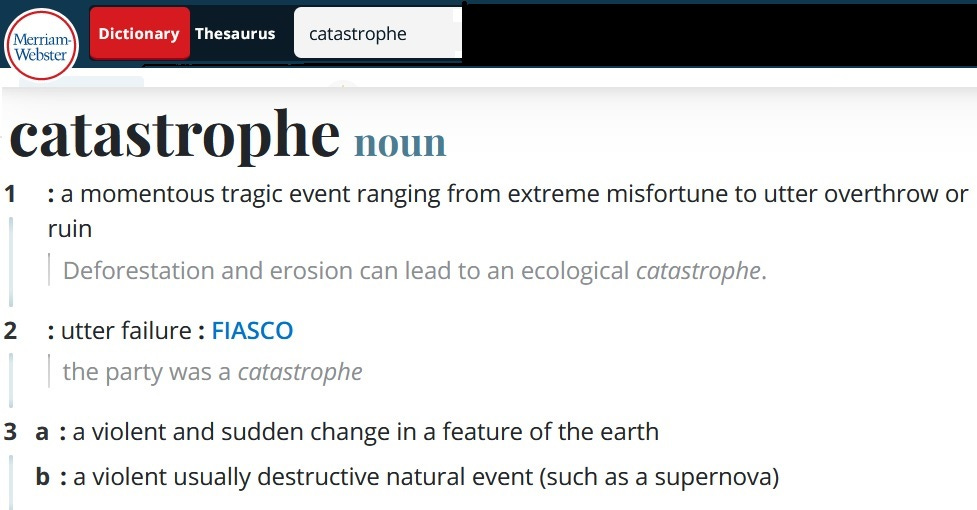
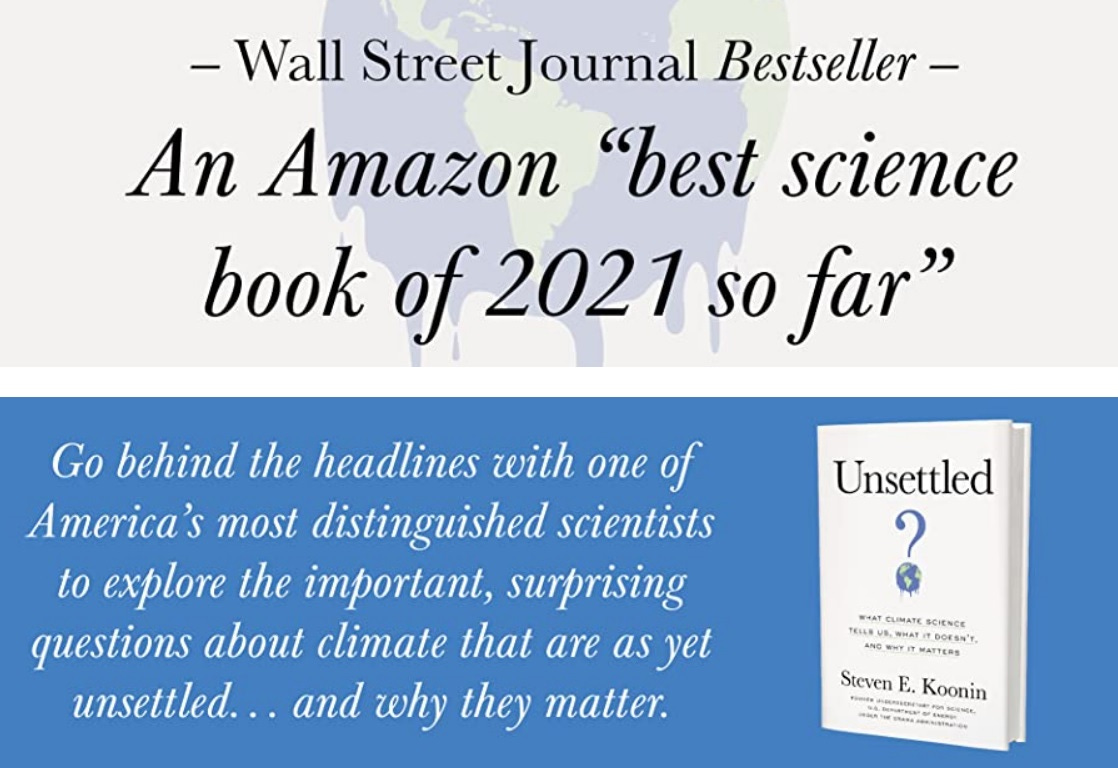
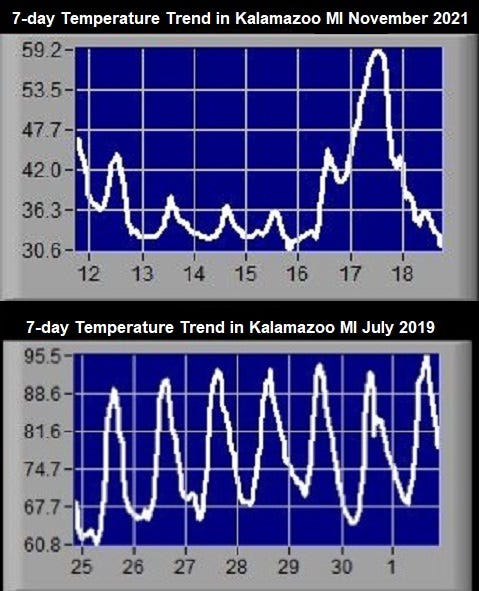

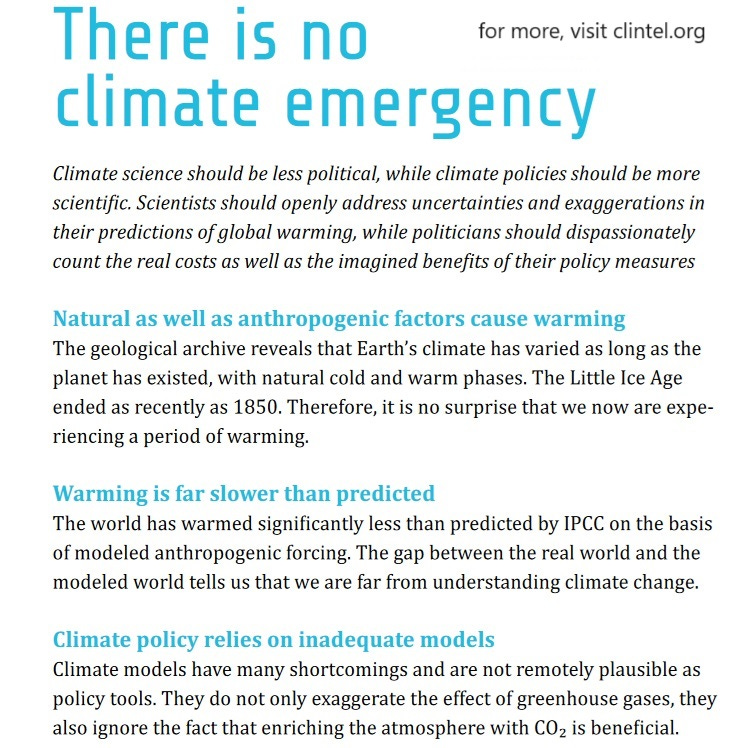
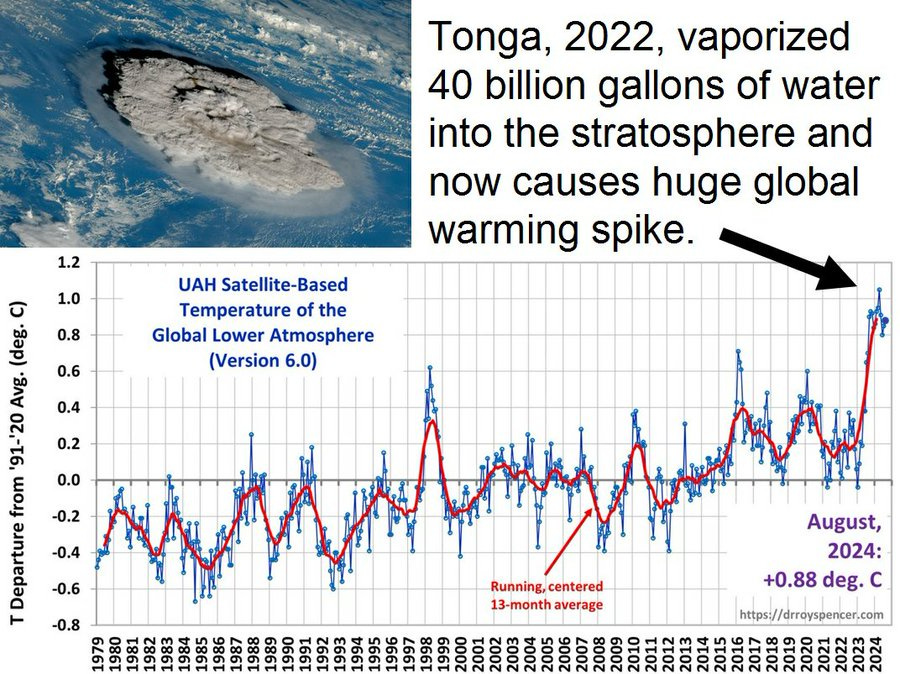
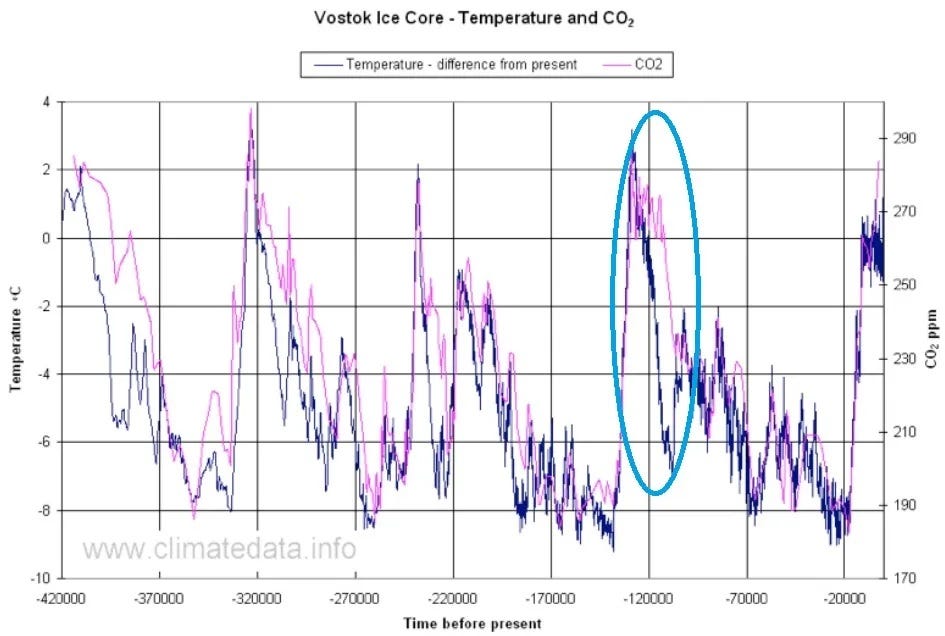
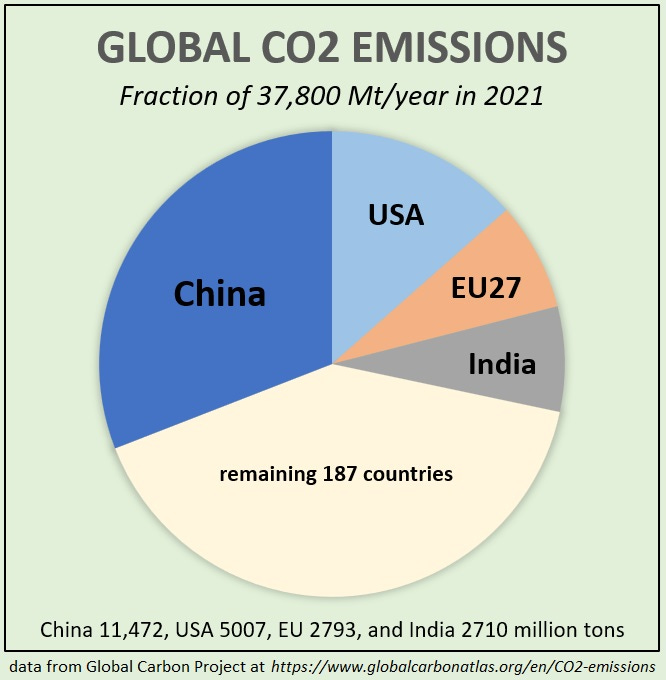
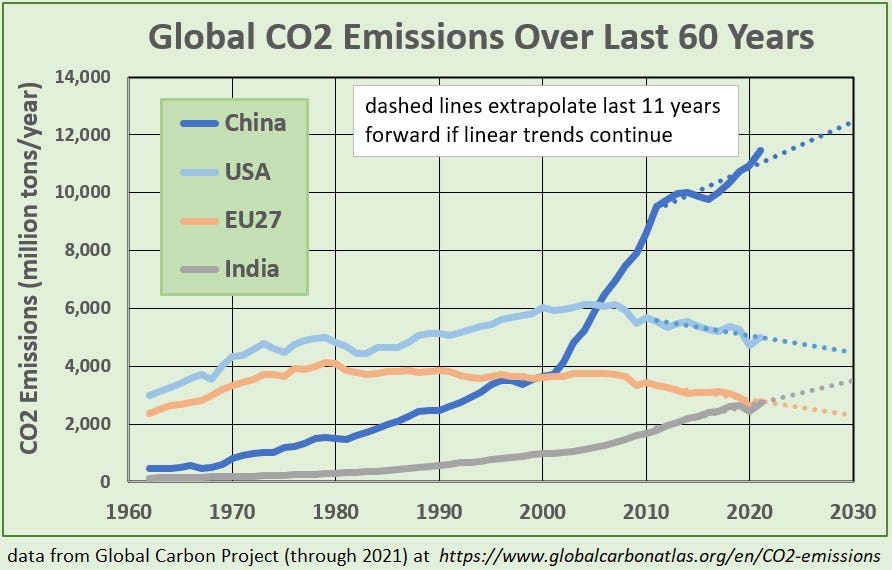
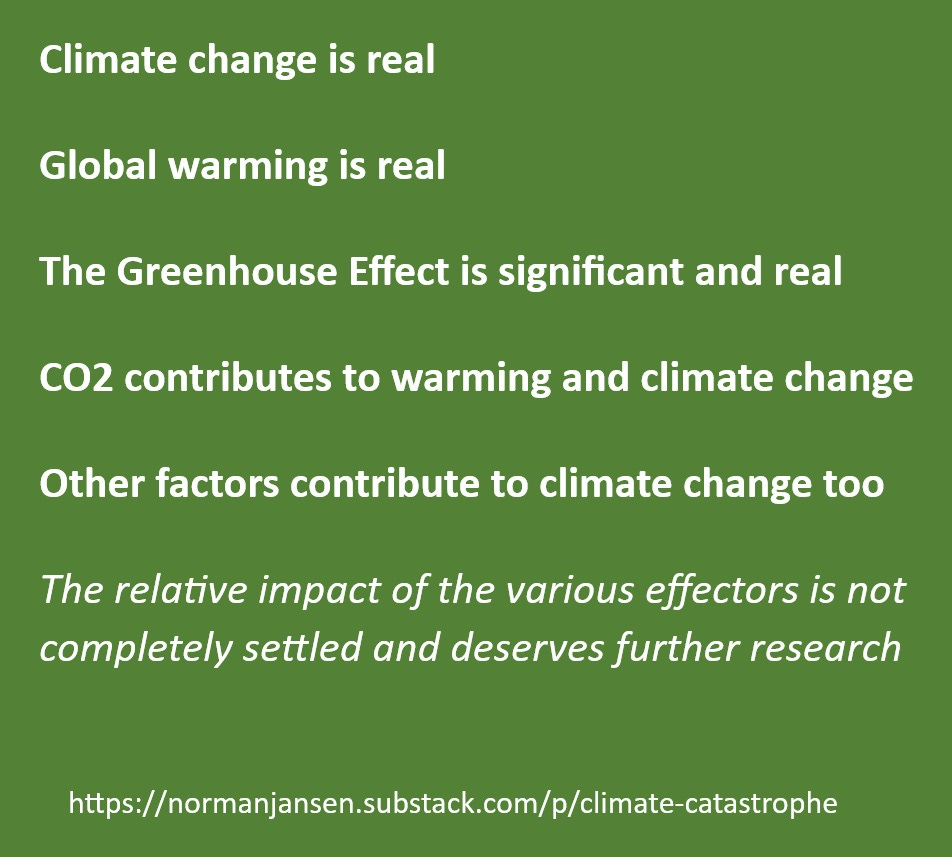
Comments
Post a Comment